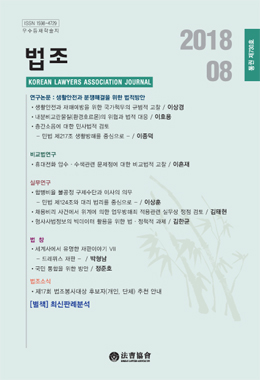헌법재판소와 행정법원은 공권력 행사에 대한 통제와 국민의 권리구제에 크게 기여하고 있으며, 공법소송의 발전에 견인차 역할을 하고 있다. 그러나 헌법소원과 항고소송의 대상은 경합될 수 있다. 대법원 판례는 사실행위에 대해서도 행정처분으로 보고, 항고소송의 대상을 확대하고 있다. 그러나 행정행위의 특수한 효력이 (권력적) 사실행위에도 적용될 수 있는지는 의문이다. 법규명령이나 조례 등에 대해서도 예외적으로 항고소송의 대상을 인정한 사례가 있다. 그러나 주위적 규범통제가 도입되지 않은 상황에서 부수적 규범통제를 통해 간접적으로 법률하위규범의 위법성을 심사할 수밖에 없다. 항고소송의 확대를 주장하는 항고소송 중심주의는 일본의 학설 및 판례로부터 영향을 받은 것이다. 그러나 헌법재판소와 헌법소원 제도가 없는 일본의 사례를 우리나라 공법소송의 구조에 그대로 접목하는 것은 신중해야 한다. 일본에서도 항고소송 중심주의에 대한 비판론이 제기되고 있음은 주목할 사실이다. 행정작용의 본질과 특성에 적합한 소송형식을 인정하는 것이 요구된다. 행정입법의 부작위는 헌법소송이 아니라 행정소송의 관할로 보는 것이 타당하다. 이에 적합한 소송형식에 대해서는 논란이 있지만, 이러한 소송을 항고소송으로 해결할 수는 없다. 이는 공법소송의 법률관계에 관한 문제이며, 법원의 전향적(轉向的)인 판단이 요구된다. 위법한 법률하위규범에 대한 헌법소원은 허용되지만, 규범통제와는 구별되어야 한다. 행정규칙에 대한 헌법소원을 인정하는 요건 중 행정의 자기구속의 법리에 근거한 헌법재판소의 논증은 타당하지 않다. 일반적인 행정규칙에 대해서도 헌법소원의 대상을 인정하는 판례가 있으나, 이는 공권력 개념에 대한 오해이다. 대외적 구속력은 공권력 개념의 핵심적 요소이다. 따라서 대외적 구속력이 없는 행정규칙에 대해서는 원칙적으로 헌법소원을 제기할 수 없다. 독일의 학설 및 판례도 그러한 입장이다. 향후 이른바 ‘법령보충적 행정규칙’은 제한적으로 허용되어야 하며, 법률유보의 원칙의 관점에서 본질적인 사항을 법률 또는 법규명령의 차원에서 규정하도록 유도해야 한다. 또한 법규적 사항을 법규명령에 위임하는 경우에도 명확성원칙이나 포괄위임금지원칙에 위배되는지 여부를 엄격히 심사해야 한다. 법규범이 지방자치단체의 자치권을 침해하는 경우에 공법상 권리구제수단이 흠결되어 있는데, 독일의 지방자치단체 헌법소원제도를 입법적으로 참고할 만하다.
The Constitutional Court of Korea and the Administrative Court have contributed greatly to the control of the exercise of public authority and the relief of the rights of the people and they have played a role in the development of public law suits. However, the object of the appeal litigation can be competed with that of the constitutional complaint. The cases of the Supreme Court of Korea sees the factual act as an administrative disposition, and the Supreme Court extends the object of appeal litigation. However, it is doubtful whether the specific effect of administrative act can be applied to factual acts (Realakt) without powerful character. There are cases where the object of an appeal litigation is exceptionally recognized even with regard to regulations and ordinances. However, in the absence of primary norm control (prinzipale Normenkontrolle), the court examines indirectly the illegality of regulations and rules through ancillary norm control (inzidente Normenkontrolle). Some scholars that claims to expand the objects of the appeal litigation were influenced by Japanese doctrines and judgments of courts. However, it is prudent to incorporate the doctrines and cases of Japanese judicial system without Constitutional Court and Constitutional complaint into the structure of Korean public law suits. It is noteworthy that criticism against excessive expanding of objects of the appeal litigation has been raised in Japan. It is required to recognize the types of lawsuits that are appropriate to the nature and character of administrative acts. The omission of delegated legislation is not object of a constitutional litigation, but a jurisdiction of administrative litigation. There is a controversy about the proper form of administrative litigation, but it cannot be filed by an appeal litigation. This is a matter related to the legal relation of a public law suit and requires a proactive judgment of the court. Constitutional complaint against illegal administrative legislation like regulations and rules is allowed, but it should be distinguished from the form of norm control. The argument of the Constitutional Court based on the principle of self-binding of the administration among the requirements to recognize the object of the constitutional complaint for the administrative rule, is inaccurate and wrong. There is a precedent in general administrative rules that recognizes the object of constitutional complaint, but this is a misunderstanding of the concept of public authority. External binding force is a core element of the concept of public authority. Therefore, in principle, the Constitutional complaint cannot be filed for administrative rules without external binding force. German doctrines and judgments of the Federal Constitutional Court (Bundesverfassungsgericht) are such a position. The so-called 'Supplementary Administrative Rules of the Statute' should be allowed only to a limited extent and induce them to define essential matters from the perspective of the rule of law at the level of statute or regulation. In addition, when delegating legal matters to regulations and rules, it is also necessary to strictly check whether the principle of clarity or the principle of prohibition of comprehensive delegation is violated. If the norm like statute and regulation violates the autonomy of the local government, the means of relief in the public law is deficient in Korea, and the German constitutional complaint of local government is worth referring for legislation in relation to this.




